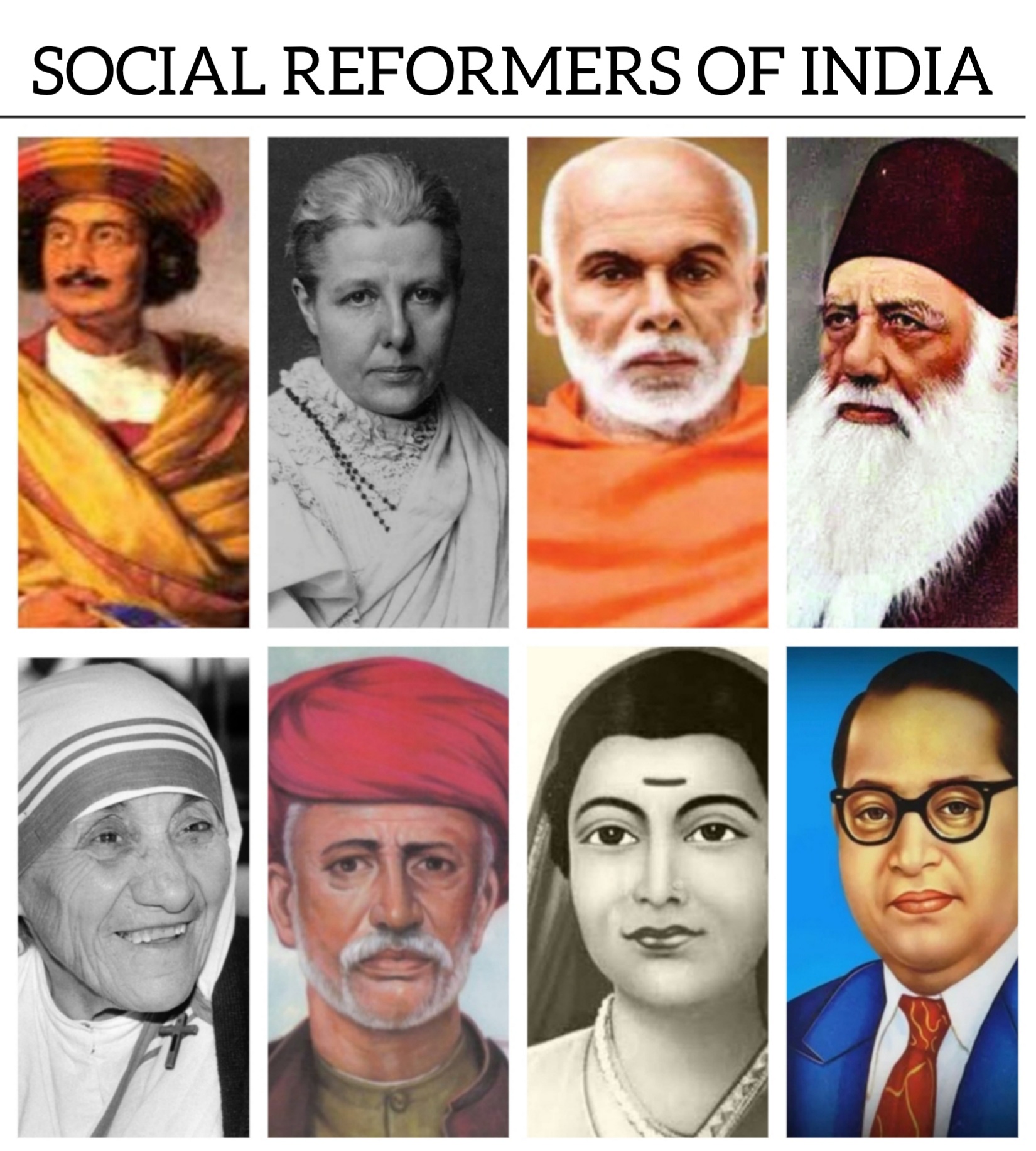- Raja Ram Mohan Roy (1772-1833)
Famously known as Father of Indian Renaissance. He was born in a conservative Hindu family of Bengal. He had received excellent education and was well versed in many languages like Sanskrit, Arabic, Persian, English, French, Greek, Latin and others. He had also studied the cultures and practices of Hinduism, Islam, Christianity, Sufi and Buddhism. Ram Mohan Roy studied the Upanishads. He blended modern education and rich Indian concepts for social reforms.
He advised people to unite against caste system, child marriage and sati. Orthodox Hindus condemned him for acts. He started Brahmo Samaj in 1828. Reformation of Hindu society was the aim of the Brahmo Samaj. It opposed idol-worship, polytheism and encouraged monotheism. Since his efforts exposed Indians to western political thoughts, it helped Indians develop nationalism. He also started a newspaper in Bengali called ‘Samvada Kaumudi’.
- Annie Besant (1887-1933)
An Irish woman who became a beloved daughter of India. She came to India in 1893 and renewed the activities of Theosophical societies in India. She stood with Indian leaders like Bal Gangadhar Tilak for freedom of the country and aroused pride in Indian culture through her lectures. Her attempt to establish equality, universal brotherhood and harmony in society remarkable. She even started a newspaper called ‘New India’. She started Home Rule Movement in 1916. Annie Besant chaired Calcutta sessions of Indian National Congress in 1917. She was the symbol of awakening of Women in India.
- Sree Narayana Guru (1855-1928)
He is a social Reformer from Kerala. Born at Chempazhanthi near Thiruvananthapuram on August 20, 1856, he left his family and spent many years as a wandering monk. Narayana Guru meditated for 8 years at Pillathadam cave at Maruthwamala mountain and attained enlightment. He consecrated an idol of Shiva on Shivaratri day of 1888 at Aruvipuram. He advised backward castes to educate themselves and get uplifted. He initiated a chain of reforms in Kerala which is the state to become a model of social changes.
- Syed Ahmed Khan (1817-1899)
A reformer and spiritual leader of Muslim society Sir. Syed established the Mohammadan Anglo-Oriental College in 1875 to provide modern education to the Muslim community and it is the Aligarh Muslim University now. Its main objective was to provide religious education along with western education, and to create a modern society through western education. He stood tor the awakening of Indians against exploitation through education. He advised Muslim population of India to face the realities of modern lite and change themselves. He supported female literacy and condemned polygamy and ideas against widow marriage.
- Mother Teresa (1910-1997)
Commonly known as the Saviour of the poor and orphans of Calcutta. She was born in present day Skopje, North Macedonia. She came to India as a young nun in 1921. She founded the Order of Missionaries of Charity in 1948. Mother Teresa became synonym of charity and love. She was a true epitome of compassion, love, and kindness, who spent her entire life serving the poor and needy. She received Nobel Prize for peace in 1979. She was beatified on 19, 2003.
- Jyotiba Phule(1827-1890):
Jyotibha Phule established Satyashodak Samaj. He believed that freedom was the basic necessity of every individual. He urged prohibition of liquor and opposed gender inequality, denial of human rights, exploitation of people and practice of untouchability. He condemned the slavery of Shudras and Dalits and criticised the people responsible for such slavery. In his book ‘Ghulamgiri’(translates to ‘slavery’), Phule gave details on exploitation of lower castes. He emphasized the need for free and compulsory education in order to bring about reform in the social system.Phule also established a primary school for girls. Later, Dr B. R. Ambedkar was influenced by Phule’s principles.
- Savitribai Jyotirao Phule(1831-1897)
She was an Indian social reformer, educator and poet from Maharashtra. In Maharashtra, she along with her husband played an important and significant role in improving women’s education in India through Sathyashodhak Samaj. She is considered a pioneer of the feminist movement in India. They together found founded one of the India’s first modern girl’s schools at Bhidewada in Pune in 1848. She worked to end caste and gender discrimination and unfair treatment of people.
- Dr B. R. Ambedkar(1891-1956)
One of the architects of Indian constitution, B. R. Ambedkar was a jurist, economist, social reformer, and a political leader. He strongly believed that political independence is meaningless without social independence. He carried out systematic study of caste system in India and came up with a plan to eradicate it. Ambedkar started revolutionary ‘Mahad’ and ‘Kalaram’ movements in order to prove that untouchables had been denied basic facilities. These movements enabled untouchables to use water and enter temples.
Ambedkar attended three Round Table Conferences and gave valuable suggestions. The demand for separate electoral constituency for untouchables brought about a conflict between Gandhiji and Ambedkar. After the constitution of India was framed, he was unanimously chosen as the chairman of Constitution Draft Committee. The Indian constitution considers practice of untouchability a crime and advocates equality. Though Ambedkar had been inspired by modernism, intellectualism and western philosophy, Ambedkar remained faithful to his native principles. In the eve of his life, he gave up Hinduism and embraced Buddhism. He was posthumously awarded the ’Bharat Ratna’ for his lifetime achievements.
